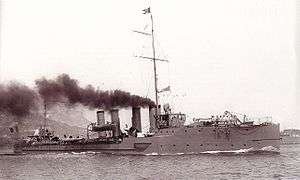French destroyer Francis Garnier
Francis Garnier was one of a dozen Bouclier-class destroyers built for the French Navy in the first decade of the 20th century.
 Sister ship Bouclier underway | |
| History | |
|---|---|
| Name: | Francis Garnier |
| Namesake: | Francis Garnier |
| Builder: | Chantiers et Ateliers Augustin Normand, Le Havre |
| Laid down: | 1910 |
| Launched: | 1 October 1912 |
| Completed: | 1913 |
| Stricken: | 10 February 1926 |
| General characteristics (as built) | |
| Class and type: | Bouclier-class destroyer |
| Displacement: | 692 t (681 long tons) |
| Length: | 72.3–78.3 m (237 ft 2 in–256 ft 11 in) (o/a) |
| Beam: | 7.6–8 m (24 ft 11 in–26 ft 3 in) |
| Draft: | 2.9–3.3 m (9 ft 6 in–10 ft 10 in) |
| Installed power: |
|
| Propulsion: | 2 shafts; 2 steam turbines |
| Speed: | 30 knots (56 km/h; 35 mph) |
| Range: | 1,200–1,600 nmi (2,200–3,000 km; 1,400–1,800 mi) at 12–14 knots (22–26 km/h; 14–16 mph) |
| Complement: | 80–83 |
| Armament: |
|
Design and description
The Bouclier class were designed to a general specification and varied significantly from each other in various ways.[1] The ships had an overall length of 74–78.3 meters (242 ft 9 in–256 ft 11 in), a beam of 7.6–8 meters (24 ft 11 in–26 ft 3 in), and a draft of 2.9–3.1 meters (9 ft 6 in–10 ft 2 in). Designed to displace 800 metric tons (787 long tons), Francis Garnier displaced 692 t (681 long tons) at normal load. Their crew numbered 80–83 men.[1]
Francis Garnier was powered by a pair of Parsons steam turbines, each driving one propeller shaft using steam provided by four water-tube boilers. The engines were designed to produce 13,000 shaft horsepower (9,700 kW) which was intended to give the ships a speed of 30 knots (56 km/h; 35 mph). Francis Garnier reached 29.4 knots (54.4 km/h; 33.8 mph) during her sea trials. The ships carried enough fuel oil to give them a range of 1,200–1,600 nautical miles (2,200–3,000 km; 1,400–1,800 mi) at cruising speeds of 12–14 knots (22–26 km/h; 14–16 mph).[2]
The primary armament of the Bouclier-class ships consisted of two 100-millimeter (3.9 in) Modèle 1893 guns in single mounts, one each fore and aft of the superstructure, and four 65-millimeter (2.6 in) Modèle 1902 guns distributed amidships. They were also fitted with two twin mounts for 450-millimeter (17.7 in) torpedo tubes amidships.[1]
During World War I, a 45-millimeter (1.8 in) or 75-millimeter (3 in) anti-aircraft gun, two 8-millimeter (0.31 in) machine guns, and eight or ten Guiraud-type depth charges were added to the ships. The extra weight severely overloaded the ships and reduced their operational speed to around 26 knots (48 km/h; 30 mph).[1]
Construction and career
Francis Garnier was ordered from Chantiers et Ateliers Augustin Normand and was launched from its Le Havre shipyard on 1 October 1912. The ship was completed the following year.[3]
References
- Gardiner & Gray, p. 203
- Couhat, pp. 101, 104
- Couhat, p. 104
Bibliography
- Couhat, Jean Labayle (1974). French Warships of World War I. London: Ian Allan. ISBN 0-7110-0445-5.
- Gardiner, Robert & Gray, Randal (1985). Conway's All The World's Fighting Ships 1906–1921. London: Conway Maritime Press. ISBN 0-85177-245-5.